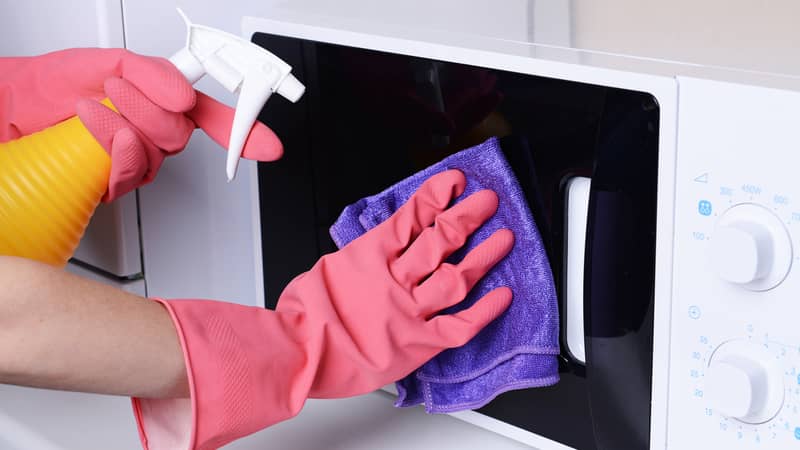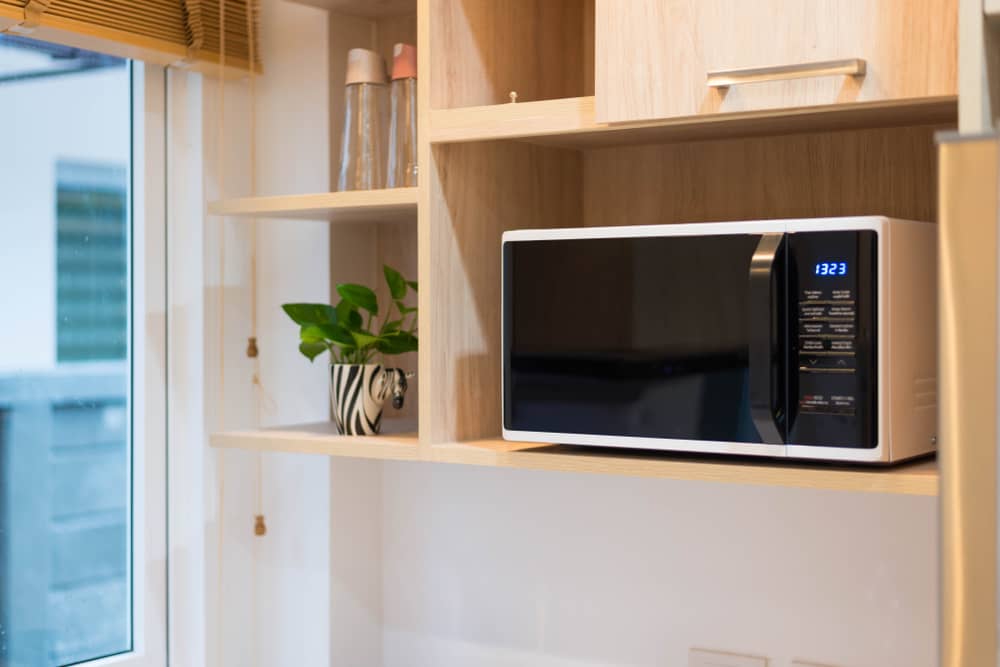Ever reheated some food only for it to go splat? Maybe you exploded some pasta sauce or popcorn. Cleaning a dirty microwave can feel a little tedious, but it is necessary – and not just after someone blew up an egg inside. (Oops.)
How to clean a microwave? You’ll need to wipe the inside of a microwave after use. Steam clean every day (or every few days) using vinegar or lemon. Deep clean every 1–2 weeks using hot water and dish soap.
Tackle stains or stubborn food bits with baking soda and/or vinegar, or even a magic eraser. And don’t forget to clean the outside of your microwave oven too!
But beyond the methods and products, the important thing is to clean regularly. So grab the vinegar and get cleaning!
Why Clean Your Microwave?
Microwaves heat food, so a clean microwave equals clean, healthy food. If you leave food and other debris to build up inside of a microwave could lead to mould and bacteria – which should not be near food.
Moreover, regular cleaning helps maintain your microwave oven. You’ll keep it working efficiently and heating your food properly, and you’ll also prolong its lifespan.
Minimise health risks and keep your microwave functional by cleaning it regularly – alongside other parts of your kitchen, like the stovetop, dishwasher, and oven. Or skip all that and let a home cleaning service take care of the cleaning for you!

How Often to Clean a Microwave
After every use, wipe the microwave interior with a paper towel or clean cloth. This includes the microwave’s turntable and the microwave door. This will prevent food and stains from building up on the interior surfaces.
Every day – or every few days – steam clean your microwave using white vinegar or half a lemon. You can also sub the vinegar with lemon juice.
Once a week, deep clean your microwave. Use this time to tackle stubborn stains and debris stuck on the inside. If you don’t use your microwave very often, you can get away with this once every two weeks or even once a month.
How to Clean a Microwave
For everyday cleaning of a dirty microwave, you can use either a white vinegar mixture or a lemon. This method uses steam to loosen any messes on the inside.
Clean a microwave with vinegar
Mix equal parts white vinegar and warm water in a microwave-safe bowl. Place into the microwave and run on high for 2–3 minutes or until the mixture boils. Then let the mixture sit for about 5 minutes.
Carefully remove the bowl (it’s hot!), then wipe the inside clean with some paper towels or a microfiber cloth.
NOTE: You can use lemon juice instead of vinegar if you prefer the scent.
Clean a microwave with lemon

Slice a lemon in half and place it cut-side down in a microwave-safe bowl. Add a tablespoon or two of water into the bowl, then place it in the microwave.
Run it on high for about 2–3 minutes, or until the lemon is hot and the interior has steamed up.
Let the lemon sit for a minute or two, then carefully take out the bowl. Use a sponge or microfiber cloth to wipe the inside.
NOTE: You can substitute lemons with other citrus fruits, like orange slices.
Clean with baking soda
For baked-on splatters and grease, or stuck-on food, try a vinegar and baking soda trick.
Pour some vinegar in a spray bottle (or mix in some water to dilute the solution.) Rub some dry baking soda on the stained areas then spritz it with the vinegar. Use a sponge to wipe away the residue.
Alternatively, spray the inside of your microwave with vinegar and water. Then dip a sponge into baking soda and scrub the interior surfaces.
NOTE: If this trick doesn’t do enough, you can use a magic eraser or melamine sponge.
Cleaning a Microwave Door
Don’t forget the inside of the microwave door! You can wipe it after using one of the steam cleaning methods, but a build-up of grease needs more elbow grease.
Mix a teaspoon of dish soap in one cup of hot water. Dip a sponge into the solution and wring it out until it’s damp.
Wipe down the door, rinsing the sponge frequently. Then rinse with a cloth dipped in clean water to rinse.
For the gasket, you can scrub it clean with a damp sponge dipped in baking soda. Get all the food spatters and work at the crannies so everything is clean.
How to Deep Clean a Microwave

Quick steam cleans are great for everyday maintenance, but you’ll have to thoroughly clean a microwave every so often. To deep clean a microwave, you’ll need:
- Baking soda
- White vinegar
- Water
- Dish soap
- Microwave-safe bowl
- Cloth, paper towel, or sponge
Dissolve 4 tablespoons of baking soda in a litre of water. Then dip a paper towel or sponge into the mixture and wipe the inside of the microwave.
Combine a 1:1 solution of vinegar and water in the bowl, then place it in the microwave. Run it on high for 3 minutes until the mixture boils. Let it sit for 10 minutes afterwards to steam up the inside.
Remove the bowl carefully, alongside the turntable and carousel. Set the bowl aside. Wash the turntable and carousel in hot, soapy water – or put them in the dishwasher if the manual says it’s safe.
While those are drying, wipe the microwave’s interior with a sponge or cloth dipped in the remaining vinegar mixture. Ensure you don’t leave any baking soda residue. You can go over the inside with a damp cloth to be sure.
Dry everything (including the microwave!) and replace the parts. Then you’re all done!
If your microwave has an exhaust system, you may need to clean the filter. Check the manual to see if the filter is removable and washable – if it is, let the filter soak in water with a few drops of dish soap. Scrub lightly, then rinse and let it dry.
Cleaning the Outside of Your Microwave

You use the same 1:1 mixture of vinegar and water to clean the outside of your microwave oven.
Spritz it on the outside and use a microfiber cloth to wipe the surface clean. This will prevent the outside from streaking.
Tips for Microwave Maintenance
Besides these cleaning methods, here are some nifty tips for keeping your microwave clean and tidy.
1. Clean the microwave turntable
Don’t forget to clean the turntable as well! It’s prone to catching food spills and stains while your food heats up. You can simply wash it in hot, sudsy water then dry.

2. Wipe the microwave’s interior every day
If you can’t wipe the microwave’s interior after every use, then do it once a day. This will prevent microwave dirt from building up.
3. Cover food while heating
Prevent stains as much as possible by covering food while heating.
You can use paper towels or a plate cover to reduce splatter. Do not fully seal off any containers as they could explode.
4. Remove odours
If you’ve burnt popcorn or gotten any other burnt smell inside, just place a bowl of baking soda inside and leave it overnight. The substance will absorb any smells.
You can also air out the microwave by leaving the door open.
5. Avoid chemical products
Don’t use cleaning products like bleach or window cleaner around your microwave – they could leave a residue that will transfer to your food.
Natural and organic products will work wonders, and best of all, they’re already in your kitchen!

